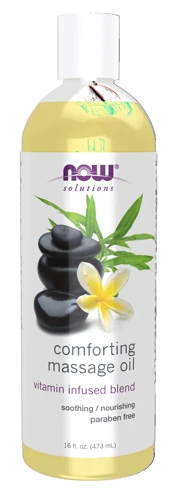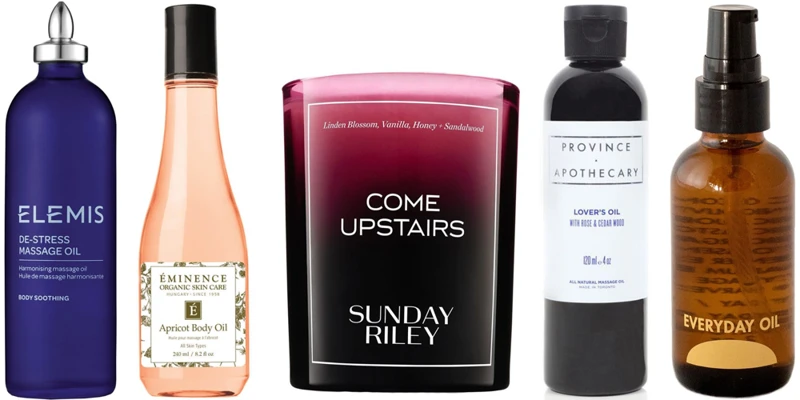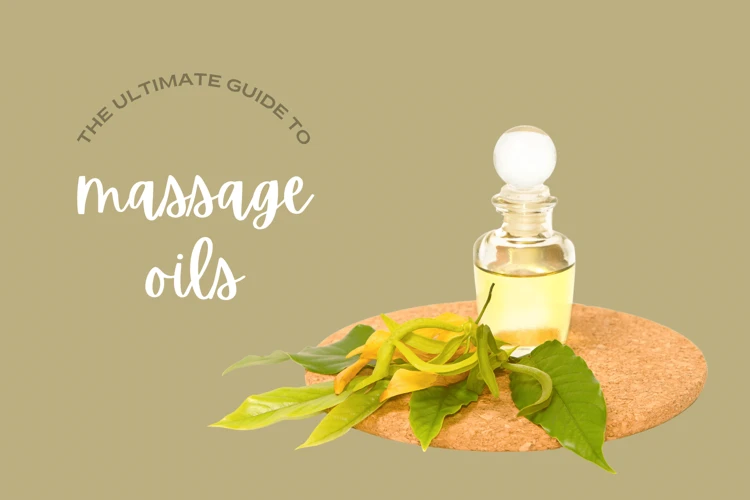Massage oil is a therapeutic lubricant used in massage therapy to enhance relaxation, reduce friction, and nourish the skin. It typically contains a blend of carrier oils, essential oils, and plant-based extracts, each offering unique benefits. Whether you’re looking to relieve muscle tension, hydrate your skin, or create a more soothing massage experience, the right massage oil can make a significant difference.
Table of Contents
What Is Massage Oil?

Massage oil is a lubricant used to facilitate a smooth, friction-free massage. It is formulated to provide a comfortable and soothing experience. Massage oil can be used for a variety of massage techniques, including Swedish, deep tissue, and hot stone. It is typically made from hydrating plant oils, such as sweet almond, coconut, and jojoba, and may contain essential oils, herbs, and other natural ingredients.
What Does Massage Oil Do? Massage oil is a lubricant that helps reduce friction and make the massage experience more comfortable and enjoyable. It also helps to hydrate the skin and may provide therapeutic benefits, such as reducing stress, improving circulation, and promoting relaxation.
- It helps reduce friction and make the massage experience more comfortable and enjoyable.
- It helps to hydrate the skin.
- It may provide therapeutic benefits, such as reducing stress, improving circulation, and promoting relaxation.
When used correctly, massage oil can enhance the massage experience and provide therapeutic benefits. Before using massage oil, it is important to consider the massage technique, the type of oil, and the individual’s skin type. Massage oils are typically available in unscented and scented varieties.
Benefits of Massage Oil

Massage oil offers both physical and mental benefits that go beyond simply making a massage feel smoother. At a physical level, massage oil reduces friction between the hands and the skin, allowing movements to flow naturally and comfortably. This helps muscles respond more easily to touch, making it simpler for tension to release without irritation or discomfort 😌
Massage oil also supports skin health. The repeated contact involved in massage can dry or irritate the skin when performed without lubrication, especially during longer sessions. Oils help nourish and moisturise the skin, leaving it feeling softer and more supple afterward. With regular use, massage oil may also support skin elasticity and overall comfort, particularly for people with sensitive or dry skin 🌿
Beyond the physical effects, massage oil plays an important role in relaxation and emotional wellbeing. When touch feels smooth and continuous, the nervous system is more likely to shift into a calm, receptive state. This can slow breathing, reduce stress responses, and help the body settle more deeply into the massage 🤍
Scent and texture also matter. Lightly scented oils can subtly influence mood, creating an atmosphere that feels grounding and soothing without being overwhelming. Over time, regular massage using oil can support stress reduction, ease mental tension, and contribute to a greater sense of balance and wellbeing.
What Is the Purpose of Massage Oil?
The primary purpose of massage oil is to support comfort, flow, and relaxation during a massage. By reducing friction, massage oil allows movements to feel smooth and continuous rather than draggy or abrupt. This benefits both the person receiving the massage and the therapist, helping the session feel more fluid and less physically demanding 😌
Massage oil also helps the body relax more fully. When touch remains consistent and uninterrupted, muscles are more likely to soften and tension can release naturally. This creates a more nurturing experience overall, especially during longer sessions or when working on areas of tightness 🤍
In short, massage oil isn’t just an optional extra. It’s a practical tool that enhances comfort, supports relaxation, and improves the overall effectiveness of massage itself 🌿
Types of Massage Oil

Natural Oils
Natural oils are the most popular choice for massage oil. These oils are derived from plants and herbal extracts, such as olive, almond, coconut, and jojoba. They are rich in antioxidants and have been known to have healing properties. Natural oils are also great for nourishing the skin and are often used in aromatherapy.
Synthetic Oils
Synthetic oils are also used for massage oil. These oils are chemically derived and offer a variety of benefits, such as a longer shelf life and fewer allergic reactions. Synthetic oils can also be more easily absorbed into the skin, providing deeper therapeutic effects.
How to Use Massage Oil

Preparing the Space
Ensure the massage area is clean and comfortable. Choose a location that is free from distractions and noise. Make sure the room is warm but not too hot. Dim the lights, light some candles, and play relaxing music.
Preparing the Client
Gently explain the massage process. Ask the client to remove any clothing that will get in the way of the massage. Cover them with a sheet or towel.
Preparing the Massage Oil
Choose an oil that is appropriate for the massage. Some oils are lighter than others and may be preferred for more gentle massage techniques. If the client has a preference, try to accommodate.
Applying the Massage Oil
Start by warming the oil in your hands. Gently rub the oil onto the client’s skin in smooth, circular motions. Use long, broad strokes to cover the entire area. Continue until the entire body is covered.
Pros and Cons of Massage Oil

Pros: Massage oil can help create a smooth and friction-free surface for a massage, allowing the massage therapist to work more efficiently. It also helps to reduce skin irritation and can enhance the massage experience by providing a soothing, relaxing effect. Massage oil can also reduce friction on the skin, which helps to prevent any discomfort during the massage.
Cons: Massage oil can make it more difficult for the massage therapist to detect any knots or tension in the muscles. It can also make it harder to grip certain areas of the body, which can impact the effectiveness of the massage. Massage oil can also be messy and can stain clothing or furniture.
Safety Considerations
- Test the oil on a small area of skin: Before using any oil on the entire body, it is best to test it on a small area of skin and wait 24 hours to see if there is any reaction.
- Avoid using oil on broken skin: Massage oil should not be used on broken or irritated skin.
- Avoid using oil on areas with a rash: Massage oil should not be used on areas that have a rash, as this can worsen the rash and cause irritation.
- Read the ingredients on the bottle: It is important to read the ingredients on the bottle of massage oil before using it, as some oils may contain allergens.
- Consult with a doctor: People who are pregnant or have certain health conditions should consult with a doctor before using massage oil.
Frequently Asked Questions
❓ What Are the Benefits of Using Massage Oil?
Massage oil enhances the overall massage experience by:
🌀 Reducing friction between hands and skin for smoother strokes
💆♀️ Improving circulation and lymphatic flow
🌿 Promoting relaxation through touch and aroma
🧘 Easing joint and muscle pain, inflammation, and tension
✨ Hydrating and nourishing the skin with natural oils and nutrients
🌸 Enhancing sensory experience with calming or invigorating scents
Some massage oils are also infused with essential oils that target specific concerns like stress, anxiety, soreness, or stiffness, making them a therapeutic addition to any massage.
❓ Does Massage Oil Need to Be Used with a Carrier Oil?
Yes—essential oils must be diluted with a carrier oil before use on the skin.
Essential oils are highly concentrated and can cause irritation, especially on sensitive skin. Carrier oils like sweet almond oil, jojoba oil, or coconut oil help:
🛡️ Protect the skin barrier
💧 Improve absorption
⚖️ Maintain the oil’s therapeutic benefits without causing reactions
Premixed massage oils usually contain both essential and carrier oils in the right ratio, but if you’re DIY-ing a blend, always dilute properly.
❓ Is It Safe to Use Massage Oil on Sensitive Skin?
Generally, yes—but it depends on the formula.
For sensitive skin, opt for:
🧴 Hypoallergenic and fragrance-free oils
🌾 Gentle carrier oils like jojoba, apricot kernel, or grapeseed
🧪 Patch testing before full use
Avoid massage oils with artificial fragrances, alcohol, or citrus-based oils unless verified safe. Always monitor your skin’s reaction and rinse off after your session if needed to avoid prolonged exposure.
❓ How Often Should Massage Oil Be Used?
Massage oil can be used as often as you receive or give massages, but here’s a helpful breakdown:
🧍♀️ Dry/Sensitive Skin – 2–3 times per week
🧍♂️ Oily Skin – Daily (in small amounts)
💪 Deep Tissue Massage – Every other day
🛀 Relaxation Massage – 2–3 times per week
🧘 Therapeutic Use – As advised by your therapist
💡 For best results, apply massage oil 15–30 minutes before a session and allow it to absorb. You can also leave a light layer on afterward if your skin tolerates it well, or gently wipe it off if preferred.
Final Thoughts
Massage oil is an essential product for anyone looking to get a massage. It helps to reduce friction and make the massage more comfortable for both the masseuse and the client. When selecting massage oil, it is important to consider all of the benefits and drawbacks of the different types of massage oil. Additionally, it is important to know how to properly use massage oil so that it can be effective and beneficial.
📚 References
- Healthline: How to Choose (and Buy) a Massage Oil
- Cleveland Clinic: Massage Therapy: Benefits, Types, and What to Expect
- Mayo Clinic: Benefits of massage therapy
⚠️ Disclaimer:
This article is for informational purposes only and does not constitute medical advice. Always consult with a licensed healthcare provider or certified massage therapist before beginning any new treatment, especially if you have pre-existing health conditions or concerns.









